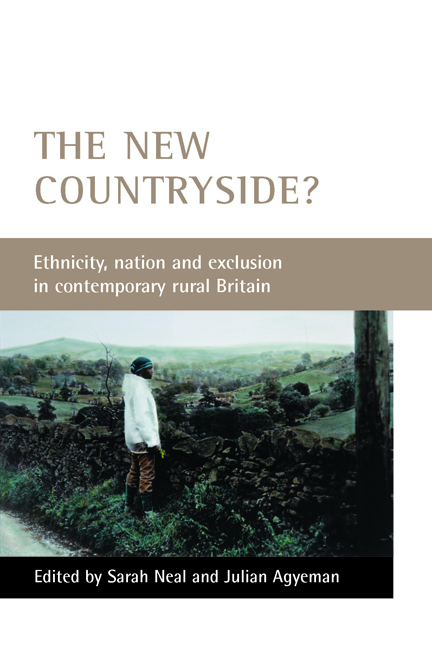nine - Rethinking rural race equality: early interventions, continuities and changes
Published online by Cambridge University Press: 18 January 2022
Summary
Introduction
This chapter highlights the key successes and challenges of the National Council of Voluntary Organisations’ Rural Anti-Racism Project in promoting race equality within the rural voluntary sector. It addresses the gaps left by the project and in light of more recent legislative changes and political priorities, examines a series of issues that need to be addressed in order that the current and emerging rural race equality initiatives are inclusive and relevant today.
Agyeman (1989) highlighted the problems experienced by Black and minority ethnic communities in accessing the countryside. However, it was not until 1992, that the concept of ‘rural racism’ gained prominence in describing the experiences of visitors as well as dwellers from Black and minority ethnic communities in rural areas. Racial prejudice and discrimination had existed in rural areas for decades but had remained largely uncharted and unacknowledged in academia, rural policy and practice.
Eric Jay's (1992) report, Keep them in Birmingham, set out to examine the extent of racial prejudice and discrimination in the rural counties of Cornwall, Devon, Dorset and Somerset in the South-West of England. Contrary to the usual ‘no problem here’ assertion, this report, which took its title from an interview quote with a white college student, highlighted countless examples of racial harassment and discrimination across key rural agencies and service providers. There was also evidence of organised activity by right-wing organisations such as the British National Party (BNP) in the South-West.
In response to the recommendations contained in the Jay Report aimed at the voluntary sector, the National Council for Voluntary Organisations (NCVO) set up a consultative group that was comprised of the Commission for Racial Equality (CRE), the Rural Development Commission (RDC) and 15 national voluntary organisations. This group debated the issues raised by the report and contributed to the development of a proposal that led to the setting up of the Rural Anti-Racism Project (RARP). The RARP was the first funded national initiative aimed at addressing rural racism by building the capacity of the voluntary sector in England and Wales to tackle the issue.
The Rural Anti-Racism Project
The RARP was originally conceived as a full-time project for a period of three to five years. However, only part funding was secured from the CRE and the Baring Foundation (with the RDC undertaking to support some specific initiatives) for a three-year period. NCVO decided to proceed with the project on a part-time basis.
- Type
- Chapter
- Information
- The New Countryside?Ethnicity, Nation and Exclusion in Contemporary Rural Britain, pp. 217 - 238Publisher: Bristol University PressPrint publication year: 2006



